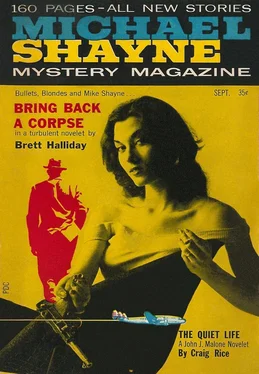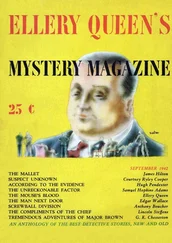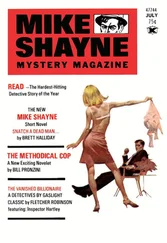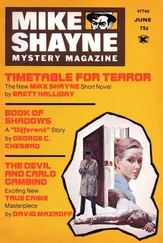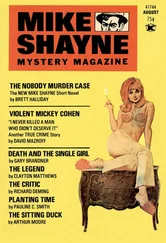Robert Bloch - Michael Shayne Mystery Magazine. Vol. 1, No. 1. September 1956
Здесь есть возможность читать онлайн «Robert Bloch - Michael Shayne Mystery Magazine. Vol. 1, No. 1. September 1956» весь текст электронной книги совершенно бесплатно (целиком полную версию без сокращений). В некоторых случаях можно слушать аудио, скачать через торрент в формате fb2 и присутствует краткое содержание. Город: New York, Год выпуска: 1956, Издательство: Renown Publications, Жанр: Детектив, на английском языке. Описание произведения, (предисловие) а так же отзывы посетителей доступны на портале библиотеки ЛибКат.
- Название:Michael Shayne Mystery Magazine. Vol. 1, No. 1. September 1956
- Автор:
- Издательство:Renown Publications
- Жанр:
- Год:1956
- Город:New York
- ISBN:нет данных
- Рейтинг книги:3 / 5. Голосов: 1
-
Избранное:Добавить в избранное
- Отзывы:
-
Ваша оценка:
- 60
- 1
- 2
- 3
- 4
- 5
Michael Shayne Mystery Magazine. Vol. 1, No. 1. September 1956: краткое содержание, описание и аннотация
Предлагаем к чтению аннотацию, описание, краткое содержание или предисловие (зависит от того, что написал сам автор книги «Michael Shayne Mystery Magazine. Vol. 1, No. 1. September 1956»). Если вы не нашли необходимую информацию о книге — напишите в комментариях, мы постараемся отыскать её.
Michael Shayne Mystery Magazine. Vol. 1, No. 1. September 1956 — читать онлайн бесплатно полную книгу (весь текст) целиком
Ниже представлен текст книги, разбитый по страницам. Система сохранения места последней прочитанной страницы, позволяет с удобством читать онлайн бесплатно книгу «Michael Shayne Mystery Magazine. Vol. 1, No. 1. September 1956», без необходимости каждый раз заново искать на чём Вы остановились. Поставьте закладку, и сможете в любой момент перейти на страницу, на которой закончили чтение.
Интервал:
Закладка:
He looked at the table, again read a couple of obscene titles. The Widow’s Guide. What widow? Why Wait for a Mate? This had a horribly impatient ring.
Brown remembered something suddenly and stood up. Marion emerged from the kitchen, bearing the tray with glasses and shaker as he entered it, like a sleep-walker, and crossed to the basement door. He went down the wooden steps, and looked.
Sure enough, the hole for the fuel tank was still there, unfilled. So was the bag of cement. But the new tank was gone. There was the door to Marion’s small but well-stocked darkroom. Didn’t photographers often use certain potent chemicals?
From upstairs, through the floor of the living room, he heard the muffled, steady rattle of ice in a shaker. After a full minute of thought, he turned around and went back up.
The drinks were poured and waiting, and the scene, to the eye alone, was a study in domestic peace. Marion sat in the center of the lounge, before a low stand holding their drinks. Opposite her was the large chair he favored, when at home in Camden.
“I made old-fashioneds” said Marion, superfluously. “Try yours, Richard. Tell me if it’s just right.”
Just right for what? Still standing, Richard glanced once at the glass placed next to his chair, then at his packed suitcase, resting where he had left it beside the door.
“Tell me all about your trip,” Marion coaxed. “Don’t look so upset. After all, nothing terrible happened, did it? To you I mean?”
The question sounded both leading, and commanding. He answered it. “No.”
“Then do sit down and stop worrying. You look positively haunted, like some fugitive from justice. As if the police might link you with a lot of old crimes, any minute, and then they’d be looking for you everywhere, year after year, no matter where you went, or how you were disguised. Relax, Richard. Sit down.”
He sat down, but he didn’t relax. The horrible picture she had painted was — or could be — far too logical.
“It’s that job of yours,” Marion declared, maternally. “Travelling, I mean. The Speedie Sandwich Company asks too much, expecting you to cover such a wide territory. I think you ought to tell them that, hereafter, you’ll confine yourself to just this area — our area. Don’t you think you should — Richard?”
Richard guessed, from the tone of her voice, that a nod was expected. He delivered it. But what he was actually thinking about was the tap of a cop’s hand on his shoulder, in Florida maybe, or even Alaska, arresting Raymond-Reynold-Robert Brown for the murder of three wives.
“And I’ll keep all your books and accounts for you,” Marion informed him, with relentless kindliness. “Those petty details can be a burden. Hereafter, you can let me do all the worrying about them.”
For a moment, Brown wondered whom she was quoting, but then he envisioned the vast scope of her cooperation and the disaster it spelled. He would not only have to sell those confounded gadgets, but close scrutiny of his accounts would disclose, and foredoom, any further operations of the whole Brown speculative system.
Now she was off on some other subject altogether. It was strange, Marion never used to be much of a talker.
“... so that’s what I told the men from the company. They should take back the fuel tank until you finally decided, and, in the meantime, leave things the way they are. Have you tasted your drink, Richard? Come on, try it.” She lifted her own glass, and exclaimed, with spirit, “Bottoms up.”
Did he really have that dismal choice, between hopeless flight and his own basement?
“No thanks,” he said, desperately, making the choice.
“Oh, don’t be silly! Here, try a sip of mine.” She leaned forward, as though to proffer a taste, and the next moment he found she had pressed her glass into his hand. “You keep it. I’ll take yours.”
It was a most understanding gesture, a most reassuring gesture — temporarily. Marion drank with zest. Richard took a sip.
Nothing happened to either of them.
Minutes later, Marion was demanding his attention again.
“...so, if you decide differently, Richard, any time you want, you can change your mind,” said Marion.
“Decide?”
“About that hole downstairs.”
“Oh, yes.”
“Whatever you want. It’s up to you.”
Unfinished Business
by John E. Hasty
Desire for vengeance is a sickness — all the psychiatrists agree on this. But so is doing time for the crime of a so-called friend. Gladden burned to wipe out the wrong with a bullet, for his soul refused to file it as —
The closer to Los Angeles, the tougher it was to hitch a ride. Everybody seemed to be in a hell of a hurry. Since the Navy truck dropped him near Oxnard, Gladden figured he must have walked eight or ten miles — the largest continuous stretch since he’d left San Francisco at four o’clock that morning.
It was now two in the afternoon, with the fury of the sun pouring down on him, and the pavement scorching the soles of his shoes. He felt hot and tired, but curiously he was not hungry, although he hadn’t eaten since he’d started. It was a good thing, though, not being hungry. He was going to have to go easy on meals. He’d need most of what little money he had for return bus fare. The idea was to get back fast — kill Mac, then get back fast.
With luck, he’d be in San Francisco by tomorrow, the day after at the latest. Then he’d buy a half pint of cheap whiskey. With the smell of it on his breath and on his clothes, he’d come stumbling into the crumby little skid row hotel where he lived, stinking, dirty, unshaven, looking like any other bum who’d been on a binge.
He’d hit the sack, and pretend to sleep it off, and wouldn’t remember anything beyond drinking with a couple of winos on Howard Street. Not that anyone would question him. Who’d bother? At the end of the week, he’d report to the parole officer as usual.
The green Chevvie that picked him up south of Oxnard took him all the way to Hollywood. He uncramped himself from the seat, got out, thanked the guy, and stood there in a hot glare of late afternoon sunshine, watching the departing Chevvie lose itself in the flow of traffic. Automatically, his mind began working on the problem of how to find Mac.
In almost any other city — in New York or Chicago or Detroit — you begin trying to locate a man by looking in the phone book. But in Hollywood, people in show business considered it strategic to have unlisted numbers. An unlisted number made you appear important, big time. As long as Gladden had known Mac, the telephone directory had never listed Lyle MacComber.
Mac’s last address known to Gladden was the Sereno Apartments, near La Cienega Boulevard. It would do as a starting point. Mac had moved there from the little shack they had occupied together, because he had hooked up with a combo playing in a La Cienega nite spot, and said he wanted to be closer to the job.
“With me out every night,” he had told Gladden, “and snoring in all keys during the day, while you’re trying to paint in the next room — well, it just won’t work out. We’ll keep in touch, though. And here — here’s a couple of twenties, enough for another month’s rent. Pay it back when you land a job with Walt Disney. Otherwise, forget it.”
Mac had been kidding about the job with Disney. But a funny thing — two days later, the Disney studio had phoned Gladden and had expressed interest in the sketches he had submitted. They had wanted to talk to him on the following morning. Gladden hadn’t kept the appointment. That evening, the cops had come in, searched him and the shack.
Читать дальшеИнтервал:
Закладка:
Похожие книги на «Michael Shayne Mystery Magazine. Vol. 1, No. 1. September 1956»
Представляем Вашему вниманию похожие книги на «Michael Shayne Mystery Magazine. Vol. 1, No. 1. September 1956» списком для выбора. Мы отобрали схожую по названию и смыслу литературу в надежде предоставить читателям больше вариантов отыскать новые, интересные, ещё непрочитанные произведения.
Обсуждение, отзывы о книге «Michael Shayne Mystery Magazine. Vol. 1, No. 1. September 1956» и просто собственные мнения читателей. Оставьте ваши комментарии, напишите, что Вы думаете о произведении, его смысле или главных героях. Укажите что конкретно понравилось, а что нет, и почему Вы так считаете.
